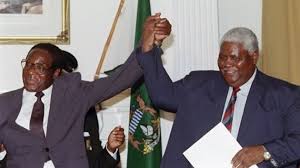The National Unity Day, commemorated on December 22 to mark the signing of a unity accord between ZANU-PF and PF-ZAPU in 1987, bringing to an end the Gukurahundi massacres which claimed over 20 000 lives, is fast losing gleam.
The day, which used to be widely celebrated like any other public holiday, such as Independence Day, during the early years of the late President Robert Mugabe and Joshua Nkomo, has over years been losing steam especially after the passing on of latter in 1999.
The holiday, which by and large, is now a holiday in name was dealt a heavy blow in 2009 when ZAPU, under the leadership of the late Dumiso Dabengwa, pulled out of ZANU-PF, citing the ruling party`s insincerity in the pact.
Despite some former ZAPU members who include Vice President Kembo Mohadi and Simon Khaya-Moyo, still maintaining that ZAPU never pulled out of ZANU-PF, the National Unity Day is no longer celebrated with significant festivities as it used to be in the years gone by.
The other contributing factor the day losing lustre could be the fact that it falls within the festive season when the majority of people would be looking forward to celebrating the Christmas holiday instead.
Ibhetshu Likazulu secretary, Mbuso Fuzwayo, said to them the day has never been a holiday and let alone a Unity Day.
Ibhetshu Likazulu is a Matabeleland pressure group.
“To us it is not Unity Day, but a day that marks the end of the spilling of the blood of innocent Zimbabweans from Matabeleland,” he told CITE.
Fuzwayo said they would instead use the day to hold a peaceful march from Joshua Nkomo’s statue in the heart of Bulawayo to Stanley Hall in Makokoba, to commemorate Gukurahundi.
“We will be commemorating the end of the genocide, remembering those who were abducted, and not accounted for, those raped, killed and buried in shallow or mass graves.”
Political analyst, Khanyile Mlotshwa, said the problem with the Unity Day was that it was an elitist arrangement that never had anything to do with ordinary Zimbabweans.
“The day needs a new narrative, new content to make it relevant and useful,” said Mlotshwa.
“I think those who are tasked with the ideological work of Zimbabwe as a nation are a complete failure. As long as some people still feel discriminated from the nation, talking about unity is a non-starter.”
Mlotshwa added: “I have faith that there is a place, in history, where the narrative of Zimbabwe as a nation can be located. However, that place is certainly not the Gukurahundi genocide that remains obscenely festering like a neglected wound on the body of the nation.”
He said just like any other holiday, the Unity Day had lost relevance to Zimbabweans.
“This is because the people have been neglected and they are preoccupied with survival. Nationalism is mostly a symbolic issue which does not put food on the tables of a lot of people, but a few political entrepreneurs. People are preoccupied with looking for food and anything that will sustain their lives,” explained Mlotshwa.
As long as the Gukurahundi issue remains unaddressed, Mlotshwa said, holidays such as the Unity Day would remain irrelevant in Matabeleland.

